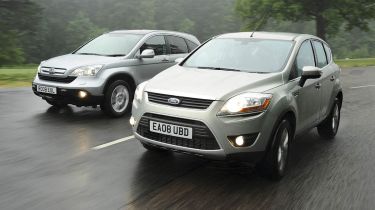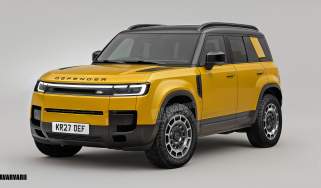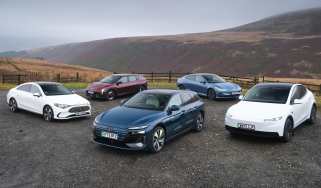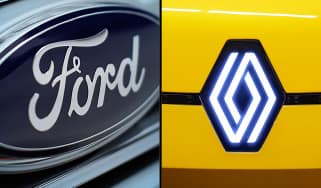Ford Kuga vs Honda CR-V
In round two, the newcomer aims to topple our current class favourite for open-road enjoyment.
Heading out of town, it’s time to see how the Kuga fares on the open road. Most compact SUVs will spend more time on the tarmac than in the mud, so car-like handling is essential for success.
Chassis engineers faced a real challenge. Top brass said the Kuga had to offer “the highest levels of ride, handling, braking and steering performance within the segment”. The pressure was on! Honda’s latest CR-V was without doubt one of the models to beat. Lower and more compact than its predecessor, it places on-road handling high on its priority list, and will set the benchmark in this pair.
The superb Focus platform gave the Ford a great starting point. Unique chassis settings and steering systems were then created to allow for the Kuga’s off-road abilities and taller stance, while the MacPherson strut and Control Blade independent rear suspension set-up that has made the hatchback such a treat to drive were retained.
On the move, the Kuga usually transmits 10 to 50 per cent of its torque to the rear wheels, determined by electronic signals from the steering, accelerator and speed of travel. However, should the stability control step in to help correct a slide, all the power can go to the front wheels if necessary.
The Kuga’s dynamics are simply staggering. The CR-V used to lead the way on the road, but it doesn’t take long in the Ford to see that there’s a new SUV agility champ. While it’s not quite as good as a Focus, the 4x4 comes amazingly close to matching the light-footed abilities of the hatch.
Most importantly, the ride quality is excellent. The set-up will feel firm to those stepping out of a Land Rover, yet it’s never uncomfortable. Soaking up the bumps has long been the Honda’s shortfall, and it thumps and crashes over undulations that leave the Ford unruffled.
Equally impressive is the way the Kuga can tackle high-speed corners. The power-steering is light but accurate, letting you turn into bends with confidence, and there’s an abundance of grip and neutral body control. Take the wheel of the CR-V and you will enjoy a similar experience, but a lack of traction from the front wheels can lead to understeer. Neither is the Honda’s steering as precise.
Later this year, the Kuga’s amazing on-road abilities are set to be exploited even further. Ford is planning to add a 197bhp version of the Focus ST’s 2.5-litre five-cylinder petrol unit, to give the SUV sparkling performance. This will get the option of an automatic gearbox, while the oil-burner has only a slick-shifting six-speed manual.
The Kuga’s driving position is much sportier than the Honda’s: you sit lower and feel closer to the tarmac. Yet isn’t a commanding view meant to be part of an SUV’s appeal?
The CR-V is beaten hands down out on the road, but in many other ways it fulfils a broader brief. The Honda’s dash feels more distinctive than the Ford’s, with great build quality and smart design features such as the compact handbrake lever. Also, passengers in the back get more space; the Ford is no more practical than a five-door Focus. If you regularly carry adults in the rear, the Kuga’s limited headroom could be a real drawback.
While the CR-V has a traditional tailgate, the Ford’s ‘double door’ system gives two loading methods. It’s easier to put small items in the back, but the tailgate is large, and heavier to operate. And the set-up can’t compensate for the fact that the Honda’s boot is 196 litres bigger, at 556 litres.
Neither model has a particularly clever rear-seat folding mechanism. Each limits overall load length if you stow both the squab and the backrest against the front chairs.
The Honda also makes up some ground with its engine. Even though we were impressed with the 2.0-litre Ford, it couldn’t quite match the 2.2 Honda’s in-gear acceleration times. What’s more, while the i-CTDi isn’t as refined as the latest i-DTEC oil-burner in the new Accord, its whirring note is preferable to a traditional diesel rattle.
The CR-V starts at £18,990 in petrol form, while our high-spec diesel costs £25,090 – over £500 more than the Kuga. Will its extra practicality justify the price?
Economy
High-quality service is one thing Honda buyers can expect when they take their CR-V in for a check-up. Consistently strong rankings in our Driver Power dealer survey show customers are happy. Hondas also have a clean reliability record, which means you shouldn’t need to make unscheduled trips to the dealer, either. Unfortunately, the CR-V couldn’t match the economy of the Kuga, and the higher price and emissions make it more costly for business users.



